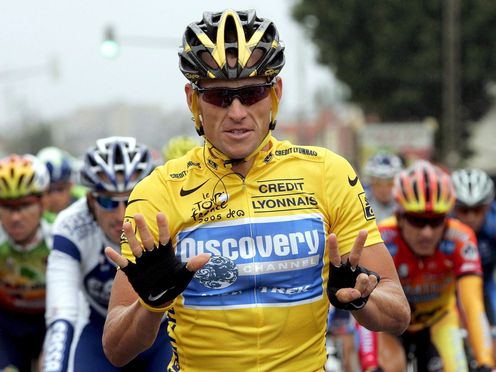#10 Sports cheats and plagiarists
I have always loved watching sports. Being a writer, I think the greatest appeal comes from the prospect of watching an unscripted ending. Whether that be a fairy tale result, a come-from-behind victory or an underdog that wins against all odds. When an athlete announces that he or she is drawing the curtain on a stellar career, you can rest assured that a book is not that far behind. But that was once upon a time, and if I mention the name Lance Armstrong, you soon realise this story doesn't end with the words and they all lived happily ever after. Which is a shame, because suddenly I don't know what to make of all the memories that sport has given me in my lifetime.
Good grief, over the past hundred years sport has evolved from a social game constructed around a set of rules, to a muti-billion dollar industry centered around huge player payments and endorsements. Players are drafted and traded on their way to becoming heroes to the next generation of kids eager to follow in their footsteps. Along with the trappings of success comes the temptation to win at all costs. And along the way, cheating has evolved from Rosie Ruiz simply jumping out from the crowd near the finish line to win the 1980 Boston Marathon in record time, to Lance Armstrong dropping the bombshell on the world that he had used performance enhancing drugs on his way to winning the Tour de France a record 7 times.
I live in Australia, in a nation that prides itself on being sports mad. For my entire life I've taken the same view of many fellow Aussies, that incidents of match fixing and athletes taking performance enhancing drugs only happen in other countries. Not anymore, in fact I've grown tired of the drawn-out ASADA investigation into the Essendon Australian Rules Football Club and the Cronulla National Rugby League team. As a result, Australian sport lost its innocence, and footballers from all codes across the country suddenly had a shadow of doubt placed over their names. But my gripe isn't with the who, why and how sport managed to fall to this point. Frankly, I just feel ripped off when I'm sold a fake story.
As a writer, I feel that cheating in sports is akin to plagiarism in writing. So what do you call an auto-biography of a sports star who years later comes clean and tells the world they had lied to the public? Simple, you call it fiction. As a writer of fiction, that thought leaves me worried that my competition in the marketplace has just increased substantially. A writer found guilty of plagiarism soon discovers that it is an impossible road back once that trust is broken. Yet we have a huge market of athletes from all sports penning biographies once their playing careers are over. What do we do with a pile of books if years later these top athletes of our time come out and admit to doping? Not only would we have been sold a false account in their book, but also a false performance on their chosen playing field. It's an issue that worries me.
I took two weeks off work in 2000 and paid a fortune to attend the Sydney Olympics, only to discover years later that one of the stars I saw in action, US athlete Marion Jones who went on to collect five medals, admit to doping. I was never a life-long cycling fan, but I stayed up many times late at night just to see Lance Armstrong, believing I was witnessing something special. It turns out I wasn't. It is one thing for an athlete or team to come out and say they cheated and are sorry, but will I ever get the money back that I paid to see them? Will they ever return the sleep I lost in staying up late at night to cheer them on? Probably not.
Writers over the course of history have lined our bookshelves with many fine tales of lost empires and ancient civilizations. I wonder if this is the beginning of a modern day equivalent. The death of sport. For the love of the game I surely hope not. It's easy to forget all the good work that athletes have done over the years when you no longer know what to believe. At the top level at least, it appears that playing purely for the love of the game is beyond the point of resuscitation.
Perhaps the last authentic game of football that I witnessed in my life was my son's final game of junior football for the Under 14 Caloundra Panthers Australian Football Club. They won their grand final and my son left the game a premiership winning player after missing the finals the previous year with a broken collar bone. Perhaps it's a timely reminder to us all. We've created a world of false idols, only instead of making a golden calf, we've dressed them all in team colours. As I said at the beginning, I love sport. I love watching an unscripted ending unfold live before my eyes, not knowing if my team is going to get up for a win before the final siren. But if it turns out that these so called magic moments in sport aren't really that authentic after all, then I'll be the first to start watching something else, or pick up a book to read. And it won't be an auto-biography of a fallen sports star.





Comments